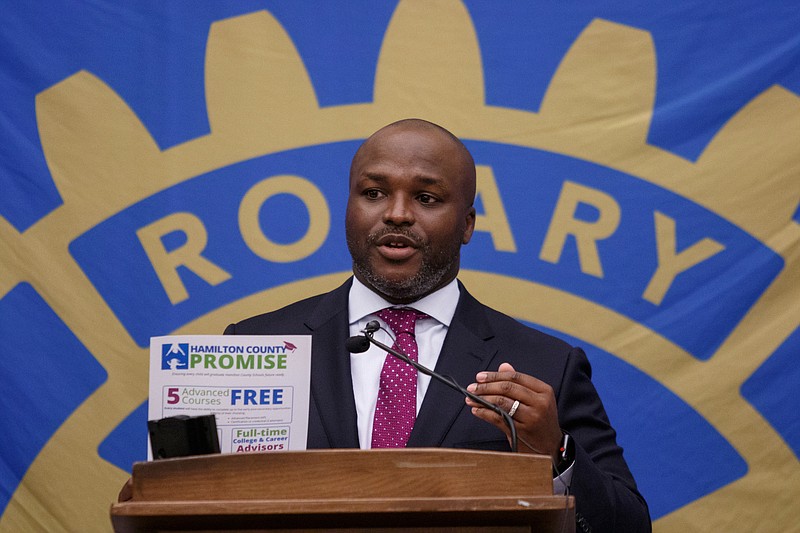Come Wednesday, Hamilton County's nine elected commissioners are expected to debate and vote on a 34-cent property tax increase that will raise the operating budget of our school system by $34 million a year. The proposed increase is aimed at improving public education in a town where employers say they can't find enough jobs-ready young people.
It's no secret that our county has dire education needs. We've chronicled those needs here many times. Likewise, local industry leaders, Chamber of Commerce leaders and school leaders have made the case for better education here, commissioning reports in recent years that show - no matter how we've played with the numbers - that only about a third of our third-graders can read at grade level.
Since students after the third grade must read to learn, it should be easy for most of us to understand the correlation between that third-grade reading number and the fact that only about 38% of our high school graduates are seen as jobs-ready by local hirers. And it doesn't take a rocket scientist to understand that when the remaining 62% of graduating seniors can't get jobs that support them, they end up affecting our region's crime rate, economic growth, wages, tax base and overall financial stability.
If those 6 in 10 graduates could land a living-wage job, in a couple of years they'd be buying one of the median-value $173,900 Hamilton County homes, and they, too, would be chipping in an extra $150 in property taxes that the proposed 34-cent tax increase for education will require. Instead, many of them continue to live in poverty. Some turn to crime. Let's be real: It's cheaper to educate people than to jail them.
Last week, a couple of friends bemoaned the proposed tax increase. One was uncomfortable with the increase because he thought it would only benefit inner-city schools and children. Why should he pay for that? Another struggled with the idea that the tax increase in effect meant we're "giving up on the family" fixing itself - the family that doesn't read to infants and toddlers to get them ready to start kindergarten.
We understand those concerns, but think both are short-sighted. We have to meet children where they are and know that no matter where they live today, they will be our neighbors and co-workers (perhaps employees or employers) tomorrow. And the way we help families fix themselves is by educating all of our children to grow beyond their impaired upbringings.
Our new schools superintendent of two years, Bryan Johnson, has demonstrated an energetic ability to lead and be accountable - both to parents and to taxpayers. Scores are improving, and the system is constantly seeking better efficiencies.
In pitching the tax increase earlier this month, County Mayor Jim Coppinger said Johnson "has proven he can move it [the school system's upward achievement]." Benchmark tests students took at the end of each quarter in the just-ended school year found growth in almost every tested subject. The best example may well be in literacy: That third of third-graders on track in reading this year grew to 39.9% on track. Coppinger also praised Johnson's work to develop a long-term, strategic plan - including boosting teacher pay to attract and keep the best teachers.
"I'm 100% in," Coppinger said. "There's something here for every student [achieving and underachieving], and now we need to take it to another level" by giving our schools more resources.
This budget does that by putting a literacy coach in every elementary school and expanding the variety of jobs-ready programs and certificates in our high schools. It also would pay for a 5% raise for teachers (including a 2.5% raise paid for by state funds), add about 350 new positions and a laptop for every student. The new and much-needed positions include 15 social workers, 10 special education teachers, 11 art teachers, 42 general classroom teachers, a number of education assistants, 15 truancy officers, 14 school counselors and nine principal/assistant principals.
Some in our community have suggested we postpone approving an operating budget increase until the release of an upcoming report on the school district's facilities - something already rumored to hit us with as much as a $500 million need. But planning to deal with those capital needs may take another two to three years, and frankly waiting for that just gives us two more years of failing 44,000 children in our community.
Think about that. Each year, 44,000 kids flow through our kindergarten-to-12th-grade classroom doors. Let's just put them on hold again for another couple or three years? Wow - talk about just giving up on the family.
We've already done that for an entire generation of Chattanooga and Hamilton County children: It's been 14 years since we approved an operational budget increase for our schools. Meanwhile, the jobs market hasn't stood still. Volkswagen is making cars and needs workers with robotic skills. The gig city is growing jobs that require computer coding skills. Our hospitals can't hire nurses fast enough.
With today's job market demanding higher-quality talent, yesteryear was the time to make this investment in a better future - not just for our children, but for ourselves and our community.
We didn't do it then. We must do it now.
